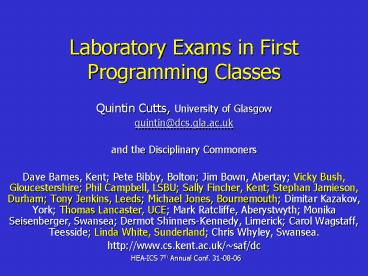Laboratory Exams in First Programming Classes - PowerPoint PPT Presentation
1 / 18
Title:
Laboratory Exams in First Programming Classes
Description:
Studs. Aber. Smaller tail and std dev. End of course MCQ answered much better ... Studs. Dur. UCE. Aber. 10% used help facility, reduced stress (no tears) ... – PowerPoint PPT presentation
Number of Views:50
Avg rating:3.0/5.0
Title: Laboratory Exams in First Programming Classes
1
Laboratory Exams in First Programming Classes
- Quintin Cutts, University of Glasgow
- quintin_at_dcs.gla.ac.uk
- and the Disciplinary Commoners
- Dave Barnes, Kent Pete Bibby, Bolton Jim Bown,
Abertay Vicky Bush, Gloucestershire Phil
Campbell, LSBU Sally Fincher, Kent Stephan
Jamieson, Durham Tony Jenkins, Leeds Michael
Jones, Bournemouth Dimitar Kazakov, York Thomas
Lancaster, UCE Mark Ratcliffe, Aberystwyth
Monika Seisenberger, Swansea Dermot
Shinners-Kennedy, Limerick Carol Wagstaff,
Teesside Linda White, Sunderland Chris Whyley,
Swansea. - http//www.cs.kent.ac.uk/saf/dc
2
Outline
- Motivation for laboratory exams
- Seven Commons models
- Comparing the models
3
Open assessed coursework
Broken!!
- Ensure student by
- trust their good nature
- warn of severe penalties
- manual code search
- automatic code search
- horrendous institutional disciplinary route
- asking questions about understanding (almost)
- Solution created by
- student
- another student
- last years student
- book author
- web author
- contract coder
4
Coursework in an ITP course
- Primary skill development mechanism
- Should skill development be mixed with skill
assessment anyway? - No!! Increased stress etc.
- Hence
- use a more formalised assessment of programming
skills
5
define laboratory exam
- Strictly controlled set of rules
- Possibilities
- time limit
- unseen questions
- limited access to other materials
- limited access to other people
- Rules upheld by strict invigilation
6
Vital Statistics
7
Vital Statistics
Smaller tail and std dev End of course MCQ
answered much better Subm marking on-line
maximises feedback Tests comprehension not memory
8
Vital Statistics
1st year of use Low ave. mark, but many students
absent this time Provision of early fback on
progress 2nd test based on cwork Security
paramount
9
Vital Statistics
10 used help facility, reduced stress (no
tears) Allows students stuck at one point to
succeed elsewhere
10
Vital Statistics
Some rote learning Assesses coding, testing
debugging only One version of exam only for
multiple sessions
11
Vital Statistics
Results match performance on other
assessments Matches intended learning outcomes
with assessment
12
Vital Statistics
Students appreciate the validity of the
exam Rapid feedback Heavy to set up, but scenario
reuse ameliorates
13
Vital Statistics
The reality of a practical exam wakes some
students up to necessary study levels Hence,
significant motivational effect
14
Three categories
- Single session, single unseen paper
- Aberystwyth, Leeds, Swansea
- Multiple sessions, multiple unseen papers
- UCE, Durham, Sunderland
- Maintains fairness and reliability
- Multiple sessions, single seen paper
- Glasgow
- Reduced assessment coverage
15
Reliability
- No cheating/communication
- invigilators
- limited/no network
- different versions of exams
- Same complexity across all versions?
- range of problems, all using same concepts
- single overarching scenario, multiple problems
drawn from it
16
Validity
- Does assessment match real world activity?
- access to books/web/earlier solutions good
- access to human assistance (at a price)
- Do assessment exercises match skill development
exercises?
17
Scalability
- Large class sizes not a problem now, but
- we can hope
- Not all these models scale
18
Conclusions
- Support for lab exams
- Improved attitudes and study habits
- Reliable feedback on progress
- Assessing full range of programming skills
- Testing comprehension not memory
- Separating skill development from skill
assessment - Reducing exam stress
- Further work
- Analysis of the problems used
- How were the students solutions evaluated?
- Comparison of exam performance against other
assessments - Disciplinary Commons































